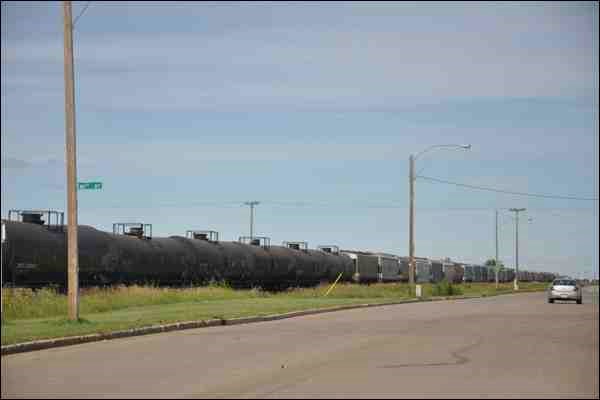North Battleford City Council intends to continue conversations with CN regarding the noise and movement of hazardous goods "at all hours of the day and night" on the west side of the city.
Council received a letter last week from west side resident Heidi Juul expressing her concerns for the safety and health of the residents near the railway tracks with the increase in rail cars transporting dangerous goods.
Juul's letter stated, "The old CN line that used to stretch northwest past Paradise Hill is largely abandoned but from Vawn to North Battleford the track still exists, providing a vital link for moving grain south from the grain terminals at Hamlin. Now the last 1.7 kilometres of this line along Railway Avenue, south of Territorial Drive and directly across the street from homes, has been repurposed as part of the switching station and is used for shunting cars filled with a variety of goods, many of which are hazardous."
Mayor Ian Hamilton said they would forward the letter to CN and would see what sort of response is received and "go further from there."
Councillor Ryan Bater said the City's conversations need to be stronger.
"We had a derailment last year and they didn't even call the City," he said.
Hamilton said things have improved significantly in the City's relationship with CN since then, but Juul's concerns were certainly understood.
Councillor Ray Fox said he would like to see more public education directly engaging citizens regarding today's increasingly numerous hazards. Having been a resident of Medicine Hat at the time of a derailment and hazardous material spill there that resulted in fatalities, prompts his concern, he said.
Fire Chief Albert Headrick, the City's director of protective services, said the City has had conversation with CN regarding hazardous materials moving through North Battleford and has plans in place as regards first responders and evacuation, depending on the severity of commodities involved,
"Hopefully nothing does occur but, it if does, we are prepared," said Headrick. "We've had the official training."
He added a City representative will be leaving at the end of this month for a week-long "very intense" course being put on by CN, and will share the information with the rest of the staff afterwards.
Juul's letter also addressed other concerns about the railroad use on the west side - noise pollution.
"There's no such thing as a quiet Saturday," she wrote. "The piercing horns that blow at over 100 decibels can make you jump out of your skin. The banging and screeching are often so loud that conversations are halted as words are drowned out. People who live half a block from tracks have items rattling on shelves when the trains are shunting."
The noise carries into the night.
"I, along with any other residents of the west side, don't get a lot of sleep some nights due to the clanging, banging cars, screeching metal, hissing airbrakes and rumbling engines. You never know which nights will be peaceful and which will be filled with the sounds of shunting trains," wrote Juul.
The City has a noise bylaw that, between 11 p.m. and 7 a.m., prohibits noises that interfere with the peace and comfort of the community.
But the bylaw does not apply to CN, Juul wrote.
"Twin diesel engines are idled for hours at a time, any time of the day or night."
She also said, "There is still more fallout from CN's decision to employ the North Battleford station as a switching station and this one has economic repercussions. The view of the Eagle Hills from Railway Avenue East on the west side has always been a source of beauty for residents and passersby. If a few grain cars were parked on the siding for a few days or weeks, it only added to the enjoyment of the prairie landscape and western sunsets. Now the view is generally of tank cars filled with hazardous goods."
She pointed out the west side has traditionally been a favoured location for homeowners.
"Buying a home on the west side has always made good financial sense," wrote Juul. "But that was before the exponential increase in train traffic. Is it fair that people who most likely have the majority of the personal wealth invested in their homes see this wealth eroded through no fault of their own?"




